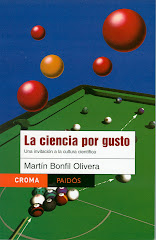By Martín Bonfil Olivera
Published in Milenio Diario, September 30, 2009
 Last week I commented that good science fiction combines genuine science and imagination, and obtains stimulant stories that reveal something about human nature or about current or future societies.
Last week I commented that good science fiction combines genuine science and imagination, and obtains stimulant stories that reveal something about human nature or about current or future societies.
On the contrary, bad science fiction constructs fantasies that "sound" scientific but are not based in legitimate scientific knowledge, and many times openly contradict it. It usually presents amazing technology, some of it real (laser beams, computers, robots) and some less plausible or plainly impossible (force fields, time machines) to sustain the drama which is actually just adventures. It's simply fantasy with a science flavour. Movies such as Star Wars and a lot of what is transmitted in TV as "science fiction" are clear examples.
But still, bad science fiction is an honest entertainment. The problem is that there are also mixtures of science and fiction which are dishonest: think of the innumerable quacks and charlatan scams that claim to have discovered new scientific principles and to possess the "secrets" to cure any disease.
Let's take a popular example. What if there was a machine capable of healing us just by being connected to it?
An American guy that calls himself "professor" William Nelson, and affirms to have worked in the Apollo project for NASA, moved to Budapest and started manufacturing a machine that "restores the bio-energetic balance of the body".
He calls it SCIO, for Scientific Consciousness Interface Operation (also known as EPFX, QXCI or Quantum Xrroid Interface System; all these name don't have any meaning whatsoever, of course).
Nelson looks just like what he actually is: a full blown charlatan, a fraud. But he is a great seller and his machine is popular in a lot of countries, including
Good science fiction is not about impossible things, but, precisely, about the things science considers possible, and starting from there, it constructs fantasies. In contrast, the SCIO machine, whose ale in the USA, by the way, is prohibited under charges of fraud, is bad science and bad fiction: a lie and a disrespect to the intelligence and good faith of people in pain.
(translated by Adrián Robles Benavides) To receive Science for pleasure weekly
in your email, subscribe here!





No comments:
Post a Comment